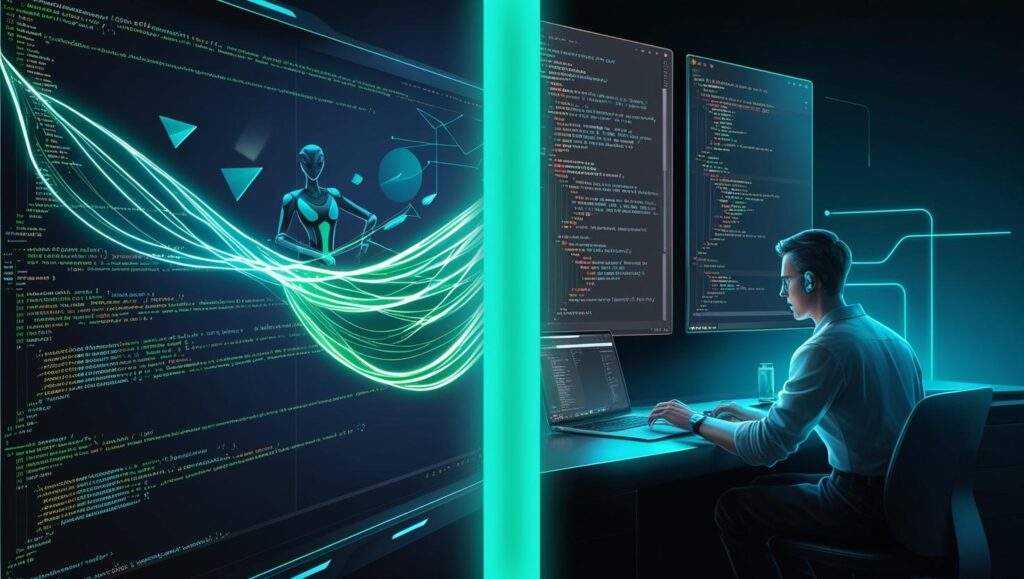
Introduction
The rise of artificial intelligence in software development has sparked debates on whether AI-assisted coding will eventually replace traditional programming. Some argue that AI tools like GitHub Copilot, ChatGPT, and CodeWhisperer are revolutionizing the industry, reducing development time, and eliminating mundane coding tasks. Others insist that manual programming remains irreplaceable, especially for complex applications that demand precision, optimization, and security.
The real question isn’t whether AI will replace traditional coding but how developers can integrate both effectively. We’re at a critical crossroads where individuals must decide how they want to approach software development. This post is not about picking a side—it’s about equipping you with the insights to make an informed decision.
1. Understanding Traditional Coding: The Core of Software Development
Traditional coding refers to manually writing code using programming languages like Python, JavaScript, C++, and Java, requiring a strong understanding of syntax, logic, and algorithms. Developers have complete control over how applications function, making this method essential for building secure, scalable, and high-performance applications.
Why Traditional Coding Still Matters
- Full Customization & Control: Traditional coding allows developers to build software from the ground up, ensuring complete control over structure, functionality, and optimization.
- Security & Reliability: Enterprise applications in finance, healthcare, and government sectors demand high-security standards that AI-generated code cannot guarantee.
- Optimization & Performance: AI tools often generate generic code that may not be fully optimized for performance. Traditional coding ensures applications are fine-tuned for efficiency.
- Debugging & Problem-Solving: AI can suggest fixes, but it lacks the ability to understand intricate project requirements and troubleshoot complex logic errors.
2. AI-Powered Coding: A Disruptive Force in Development
AI-driven development leverages tools like GitHub Copilot, ChatGPT, CodeWhisperer, and Replit AI to assist or automate coding tasks. These tools utilize machine learning and natural language processing (NLP) to generate, debug, and optimize code efficiently.
Advantages of AI-Assisted Development
- Rapid Code Generation: AI can write large sections of code in seconds, significantly reducing development time.
- Automation of Repetitive Tasks: Tasks like form validation, boilerplate code generation, and API calls can be automated, allowing developers to focus on high-level logic.
- Lower Barrier to Entry: AI tools enable non-coders to build functional applications by interpreting natural language prompts.
- Real-Time Debugging & Code Suggestions: AI detects syntax errors and suggests solutions instantly, improving coding efficiency.
Limitations of AI-Driven Coding
- Lack of Contextual Understanding: AI-generated code may not always align with business logic or user requirements.
- Security Risks: AI tools generate code based on publicly available data, increasing the risk of vulnerabilities and compliance issues.
- Inconsistent Code Quality: AI lacks creativity and may produce redundant or inefficient solutions that require manual revision.
- Over-Reliance Can Hinder Skill Growth: Developers who overuse AI might struggle with algorithmic thinking and problem-solving when AI-generated solutions fail.
3. Practical Use Cases: When to Use AI vs Traditional Coding?
Understanding when to apply AI-generated code and when to rely on manual programming is crucial for modern developers.
AI Works Best For:
✅ Prototyping & Boilerplate Code: Quickly generating foundational code structures. ✅ Automating Routine Tasks: Handling repetitive work such as API integrations, authentication, and error handling. ✅ Speeding Up Development: AI helps developers move faster by reducing the time spent on writing low-complexity code. ✅ Assisting Junior Developers: AI-generated code explanations can serve as a learning tool for those new to programming.
Traditional Coding is Necessary For:
🚀 Security-Intensive Applications: AI-generated code might introduce security loopholes, requiring manual auditing. 🚀 High-Performance & Scalable Systems: AI lacks deep optimization skills, making manual coding essential for mission-critical applications. 🚀 Long-Term Maintenance & Codebase Integrity: AI-generated code may not be structured for scalability and maintainability. 🚀 Complex Business Logic Implementation: AI cannot fully understand and execute project-specific requirements without human guidance.
Hybrid Approach: Best of Both Worlds
The most effective strategy is a hybrid approach, where developers leverage AI for speed and automation while maintaining manual coding expertise for security, optimization, and complex logic.
4. The Future of AI vs Traditional Coding: What Lies Ahead?
Some fear that AI will replace developers, but in reality, it’s changing how developers work. AI is not eliminating software jobs; rather, it’s shifting the focus from manual coding to problem-solving, design, and innovation.
What’s the Industry Saying?
- AI is a tool, not a replacement: Companies are adopting AI-powered coding tools to enhance productivity, not to remove human developers.
- Demand for Skilled Developers is Growing: AI-generated code still needs human oversight, testing, and strategic decision-making.
- The Future is Hybrid: The best developers will be those who understand how to strategically integrate AI into their workflows without losing critical coding skills.
Final Thoughts: Making the Right Choice
For further insights on AI and traditional coding, check out our in-depth analysis: AI vs. Traditional Coding: Which Approach Is Best for You in 2025?
AI-assisted coding is here to stay, but traditional coding skills remain essential. Developers must learn to adapt, evolve, and integrate AI tools while maintaining a deep understanding of programming principles.
📌 Where do you stand? Will AI revolutionize coding, or will traditional coding always be the foundation of software development? Share your thoughts!



Pingback: Remote Tech Jobs Guide: QA, AI & ML Careers in 2025